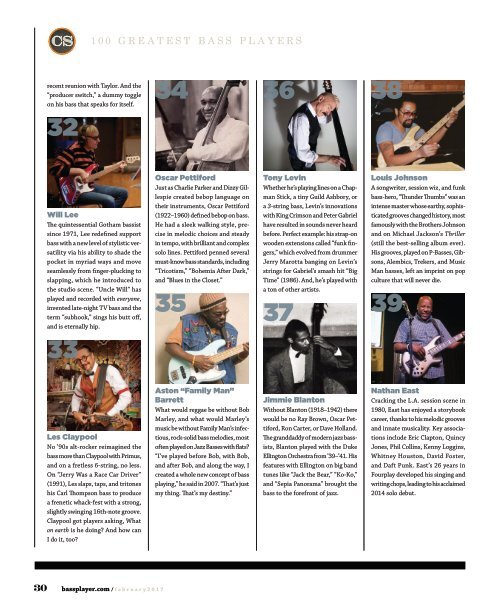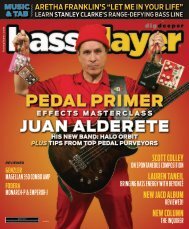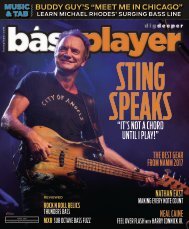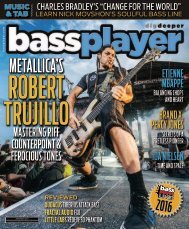Create successful ePaper yourself
Turn your PDF publications into a flip-book with our unique Google optimized e-Paper software.
CS<br />
100 GREATEST BASS PLAYERS<br />
recent reunion with Taylor. And the<br />
“producer switch,” a dummy toggle<br />
on his bass that speaks for itself.<br />
32<br />
34<br />
36<br />
38<br />
Will Lee<br />
The quintessential Gotham bassist<br />
since 1971, Lee redefined support<br />
bass with a new level of stylistic versatility<br />
via his ability to shade the<br />
pocket in myriad ways and move<br />
seamlessly from finger-plucking to<br />
slapping, which he introduced to<br />
the studio scene. “Uncle Will” has<br />
played and recorded with everyone,<br />
invented late-night TV bass and the<br />
term “subhook,” sings his butt off,<br />
and is eternally hip.<br />
33<br />
Oscar Pettiford<br />
Just as Charlie Parker and Dizzy Gillespie<br />
created bebop language on<br />
their instruments, Oscar Pettiford<br />
(1922–1960) defined bebop on bass.<br />
He had a sleek walking style, precise<br />
in melodic choices and steady<br />
in tempo, with brilliant and complex<br />
solo lines. Pettiford penned several<br />
must-know bass standards, including<br />
“Tricotism,” “Bohemia After Dark,”<br />
and “Blues in the Closet.”<br />
35<br />
Tony Levin<br />
Whether he’s playing lines on a Chapman<br />
Stick, a tiny Guild Ashbory, or<br />
a 3-string bass, Levin’s innovations<br />
with King Crimson and Peter Gabriel<br />
have resulted in sounds never heard<br />
before. Perfect example: his strap-on<br />
wooden extensions called “funk fingers,”<br />
which evolved from drummer<br />
Jerry Marotta banging on Levin’s<br />
strings for Gabriel’s smash hit “Big<br />
Time” (1986). And, he’s played with<br />
a ton of other artists.<br />
37<br />
Louis Johnson<br />
A songwriter, session wiz, and funk<br />
bass-hero, “Thunder Thumbs” was an<br />
intense master whose earthy, sophisticated<br />
grooves changed history, most<br />
famously with the Brothers Johnson<br />
and on Michael Jackson’s Thriller<br />
(still the best-selling album ever).<br />
His grooves, played on P-Basses, Gibsons,<br />
Alembics, Trekers, and Music<br />
Man basses, left an imprint on pop<br />
culture that will never die.<br />
39<br />
Les Claypool<br />
No ’90s alt-rocker reimagined the<br />
bass more than Claypool with Primus,<br />
and on a fretless 6-string, no less.<br />
On “Jerry Was a Race Car Driver”<br />
(1991), Les slaps, taps, and tritones<br />
his Carl Thompson bass to produce<br />
a frenetic whack-fest with a strong,<br />
slightly swinging 16th-note groove.<br />
Claypool got players asking, What<br />
on earth is he doing? And how can<br />
I do it, too?<br />
Aston “Family Man”<br />
Barrett<br />
What would reggae be without Bob<br />
Marley, and what would Marley’s<br />
music be without Family Man’s infectious,<br />
rock-solid bass melodies, most<br />
often played on Jazz Basses with flats?<br />
“I’ve played before Bob, with Bob,<br />
and after Bob, and along the way, I<br />
created a whole new concept of bass<br />
playing,” he said in 2007. “That’s just<br />
my thing. That’s my destiny.”<br />
Jimmie Blanton<br />
Without Blanton (1918–1942) there<br />
would be no Ray Brown, Oscar Pettiford,<br />
Ron Carter, or Dave Holland.<br />
The granddaddy of modern jazz bassists,<br />
Blanton played with the Duke<br />
Ellington Orchestra from ’39–’41. His<br />
features with Ellington on big band<br />
tunes like “Jack the Bear,” “Ko-Ko,”<br />
and “Sepia Panorama” brought the<br />
bass to the forefront of jazz.<br />
Nathan East<br />
Cracking the L.A. session scene in<br />
1980, East has enjoyed a storybook<br />
career, thanks to his melodic grooves<br />
and innate musicality. Key associations<br />
include Eric Clapton, Quincy<br />
Jones, Phil Collins, Kenny Loggins,<br />
Whitney Houston, David Foster,<br />
and Daft Punk. East’s 26 years in<br />
Fourplay developed his singing and<br />
writing chops, leading to his acclaimed<br />
2014 solo debut.<br />
30 bassplayer.com / february<strong>2017</strong>






